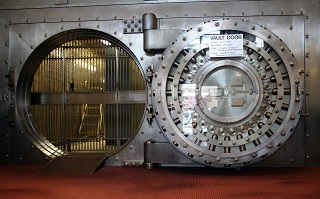In Nevada, bank fraud is prosecuted as a federal crime under 18 U.S.C. § 1344. It is defined as defrauding a financial institution out of money or other property. As a serious felony, bank fraud carries up to three decades in federal prison and a million dollars in fines.
In this article, our Las Vegas criminal defense attorneys discuss:

18 U.S.C. § 1344 is the federal bank fraud law.
1. What is federal bank fraud?
The legal definition of bank fraud is knowingly executing a “scheme or artifice” to either:
- defraud a financial institution, or
- obtain any of the money or other property under the custody of a financial institution by false pretenses.
In short, it is illegal to intentionally deprive a bank of its assets by fraudulent means.
Note that bank fraud is different than bank robbery, which involves a physical taking and carrying away. Bank fraud may be conducted without ever going into a bank and with no violence. This is why bank fraud is called a “white-collar crime.”
Below are discussions of the two central elements of the federal crime of bank fraud: 1) fraudulent artifice or scheme, and 2) fraudulent intentions.
Fraudulent artifice or scheme
There are many different types of bank fraud schemes including check-kiting, fund diversion, booster checks, phishing, and accounting fraud. Here is a common bank fraud scheme involving stolen payment cards:
Example: Jason in Reno is on line at a store. The customer ahead of him, Jill, takes out her credit card to pay, and Jason memorizes her credit card number. Jason then goes online and purchases several items using Jill’s credit card information. Here, Jason committed bank fraud for intentionally depriving the bank of assets by posing as someone else. It does not matter that Jason never physically stole Jill’s credit card. Nor does it matter that the stolen money belonged to Jill. As long as the money was in the bank’s custody, it qualifies as bank fraud.
Note that bank fraud is often allegedly committed in conjunction with other crimes including money laundering and mail fraud. In the above example, Jason would probably also face charges for wire fraud since he used the internet to carry out the fraud.
Fraudulent intentions
Bank fraud laws are not meant to punish people who make honest mistakes or do not deliberately set out to swindle anybody. Only when the prosecution proves to the court that the defendant knowingly defrauded the bank can the court hand down a conviction.
Example: Brian in Henderson goes to a bank to apply for a personal loan. When the bank processes the application, it finds that Brian’s credit score is significantly lower than what Brian said in the application. Brian is then arrested for attempting to commit bank fraud. Later, Brian’s attorney discovers that the credit agency made a mistake when it informed Brian he had a high credit score, and that Brian genuinely believed he had given the bank truthful information. Therefore, Brian should not be convicted for bank fraud because he did not intentionally set out to defraud the bank.
Note that you do not need to have succeeded in defrauding a bank in order to be prosecuted for bank fraud. Merely attempting to carry out bank fraud is sufficient to sustain a conviction in Nevada.
If Brian in the above example intentionally gave the bank false information, he could be found guilty of bank fraud even though the bank caught his fraud before they gave him any money.1
2. What are the defenses?
Here at Las Vegas Defense Group, we have represented thousands of people accused of fraud, including bank fraud. In our experience, the following three defenses are very effective with judges, juries, and prosecutors:
- You were honest. Because fraud is such a serious crime, the U.S. Attorney’s Office is required to prove beyond a reasonable doubt that you “knowingly” engaged in bank fraud before the court may convict you. Therefore, if we can show that you had no criminal intent and instead conducted yourself in good faith, made an honest mistake, and did not mean to hurt anyone, then the charges should be dropped.
- There was no fraud. Bank rules and regulations can get extremely complicated and confusing, and lawful transactions may easily be mistaken as fraudulent transfers. If we can demonstrate that the defendant violated no law and was falsely accused, then you should not be held criminally liable for bank fraud.
- The police broke the law. Bank fraud cases tend to involve thousands of pages of exhibits including bank records, bank statements, e-mails, letters and other documentation that is often private. If law enforcement may have carried out an unconstitutional search and seizure to get a hold of these documents, then we can file a “motion to suppress evidence” with the federal court. Assuming the judge agrees with the motion and eliminates the unlawfully-obtained evidence from the case, the prosecution may be left with inadequate evidence.

Bank fraud carries up to three decades in federal prison.
3. What are the penalties?
Judges in Nevada Federal Court impose the following sentence for a conviction of bank fraud:
- up to 30 years in Federal Prison and/or up to $1,000,000 in fines, and
- restitution.
Note that there are only two federal courthouses in Nevada:
- Lloyd D. George Federal Courthouse located in Las Vegas
- Bruce R. Thompson Federal Courthouse located in Reno
Note that people convicted on federal criminal charges are typically incarcerated out-of-state because there are no federal prisons in Nevada.2
Also see our article on the federal crime of presenting false or fictitious claims.
Legal References
- 18 U.S.C. § 1344. See also United States v. Shinohara (9th Cir. 2006) 209 Fed. Appx. 641; United States v. Charles (9th Cir. 2015) 626 Fed. Appx. 691.
- Same.

